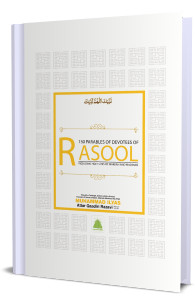Islamic beliefs
Divine Scripture
Abu Safwan Attari Madani
Just as it is obligatory (fard) upon every Mukallaf (sane, mature, Muslim) to believe in the Quran, it is also necessary to believe in the books revealed to the prophets عَـلَـيْـهِمُ الـصَّلٰوةُ وَالـسَّـلَام before Prophet Muhammad صَلَّى الـلّٰـهُ عَلَيْهِ وَاٰلِهٖ وَسَلَّم. Although it is necessary to believe in the rulings which these books contain, it is incorrect to act upon those that have been abrogated (mansookh) by the final Shari’ah. For example, in the Shari’ah of previous nations, people would pray facing Masjid al-Aqsa; it is necessary for us to believe in this, but to act upon this ruling by praying towards Masjid al-Aqsa is impermissible as this ruling has been abrogated.[1]
It is an obligation upon every individual (fard ayn) to believe as a whole (ijmaalan) in whatever Allah Almighty revealed to the prophets before the Quran.[2] One should believe that whatever books Allah Almighty revealed to the prophets by way of revelation (Wahi) are without a doubt the truth and from Allah Almighty. [3]
Believing in the Quran as a whole is an obligation in the sense that one must believe every word is from Allah Almighty and is the truth. Acquiring detailed knowledge of the Quran is fard kifaayah.[4] Allah Almighty revealed scriptures and divine books to some of His messengers, which amount to approximately 104.[5] Four of these are famous: the Torah, which was revealed to Prophet Musa عَـلَيْـهِ الـسَّـلَام; Zaboor (Psalms), which was revealed to Prophet Dawood عَـلَيْـهِ الـسَّـلَام; Injeel (the Gospel), which was revealed to Prophet Isa عَـلَيْـهِ الـسَّـلَامم; and the Holy Quran, which is the most superior book revealed to the most superior prophet, Sayyiduna Muhammad صَلَّى الـلّٰـهُ عَلَيْهِ وَاٰلِهٖ وَسَلَّم.[6] The Quran is protected from being tampered with, as this religion will remain forever. Allah Almighty has taken the responsibility of protecting the Quran, but the responsibility to protect the previous books was entrusted to the [previous] nations respectively. However, they could not protect their books. Divine revelation did not remain with them in the same condition that it was revealed. In fact, the evil people amongst them tampered with divine revelation by adding or removing whatever they wished. Therefore, if a matter from those books is presented to us which is in agreement with the Quran, we will affirm it. If it opposes the Quran, we will affirm that this is from their tampering of the text. And if it is not known whether it is in accordance with or contrary to the Quran, then the ruling is that we should neither affirm it, nor reject it; rather, it should be said:
اٰمَنْتُ بِاللهِ وَمَلٰئِکَتِهٖ وَکُتُبِهٖ وَرُسُلِهٖ
Translation: ‘I believe in Allah (Almighty), His Angels, His Books and His Messengers.’[7]
It is impossible for the letters or diacritics of the Quran to be altered even if the entire world gathered for this purpose. An individual who says that someone has removed, added or changed parts, chapters, verses, or even a letter of the Quran is unquestionably a disbeliever.[8]
An incident involving someone who attempted to distort the Quran
Sayyiduna Ahmad Bin Muhammad Yamani قُدِّ سَ سرُّہُ النُّورانی states: ‘I saw a man in the city of San’aa who people had gathered around. I enquired about him and learned that he would lead people in prayer in the month of Ramadan. He had a captivating voice and would recite the Quran in a beautiful manner. However, when he reached the verse: اِنَّ اللّٰهَ وَ مَلٰٓىٕكَتَهٗ یُصَلُّوْنَ عَلَى النَّبِیِّؕ- , he read: “اِنَّ اللّٰهَ وَ مَلٰٓىٕكَتَهٗ یُصَلُّوْنَ عَلَى النَّبِیِّ” [i.e. he added the word ‘عَلِیّ’ before ‘عَلَی النَّبِی’, which translates as ‘Indeed Allah and His Angels send their blessings upon Ali رَضِىَ الـلّٰـهُ عَـنْهُ who is a prophet’, مَعَاذَالله.] He immediately became mute, disabled and blind, and was struck with leprosy.’[9]
[1] Khaza`in-ul-Irfan, part 1, Surah al-Baqarah, verse 4
[2] Khaza`in-ul-Irfan, part 1, Surah al-Baqarah, verse 4
[3] Khaza`in-ul-Irfan, part 1, Surah al-Baqarah, verse 285
[4] Siraat-ul-Jinaan, vol. 1, p. 68
[5] Faizan-e-Sunnat, vol. 1, p. 4
[6] Bahar-e-Shari’at, vol. 1, p. 29
[7] Bahar-e-Shari’at, vol. 1, p. 30
[8] Bahar-e-Shari’at, vol. 1, p. 31
[9] al-Qaul al-Badi’, p. 87










Comments